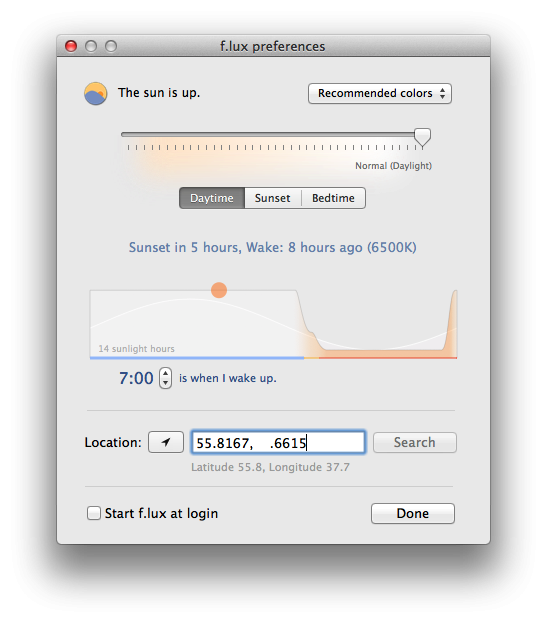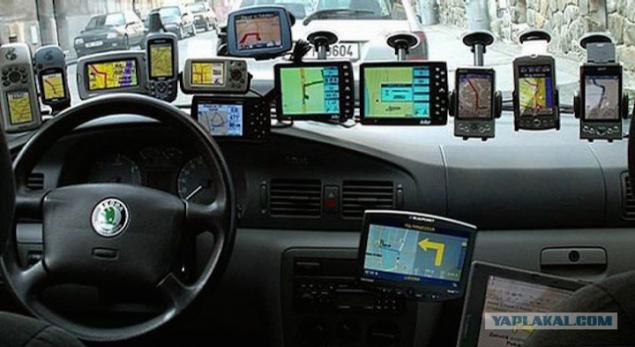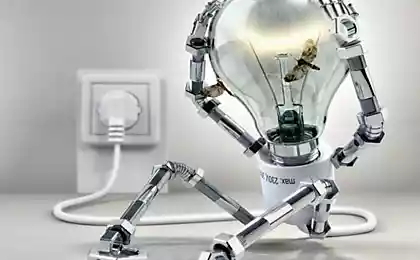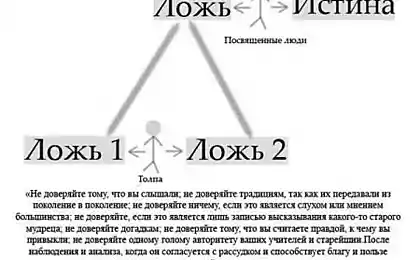665
Problems of technological society
It is believed that the ubiquity of the Internet, iPhones and tablets - clear evidence of the development of civilization. In a sense, it is. At therapeutic doses, computer games, and even aimless surfing through web pages really positive impact on human mental activity.
Meanwhile, technological advances have a downside: according to scientists, the new technology seriously rearrange neural connections in our brain, and the effects of such an impact in the long term can be disastrous for the whole of our species. However, some of the negative effects of interaction with modern technology appear today. Many of them are familiar to everyone, but we do not are aware that their cause is the abuse of gadgets in favor and not some individual factors. Here are just a few of these effects.

1. Sleep disorders
Numerous studies have shown that light with a predominance of blue spectrum (450-480 nm), which emit a variety of gadgets with LCD screens, ie, smartphones, tablets and laptops, suppresses the production of melatonin - the main hormone responsible for "internal clock" of man. Because of its lack of those "hours" and get off the body does not feel sleepy at the time when it's time to get ready for bed. Particularly sensitive to blue light teenagers, who also tend to abuse the communication with smartphones and tablets.
Sleep disturbance attracts a lot of negative consequences for the organism in general and the brain in particular. In humans, a bad mood, decreases efficiency, reduced ability to concentrate, impaired memory, not to mention the direct destruction of brain tissue.
Curiously, as experiments have shown, sunglasses with orange glasses are able to neutralize the effect of the blue rays of the spectrum, so if you sleep poorly, perhaps it makes sense to buy the glasses.

There is also a special cross-platform utility f.lux for computers running Windows, OS X and Linux, coloring screen in orange tones in the evening and night time, and allows you to save the correct mode of the day.

2. Violation of concentration
We do not need any research to be noted that the new technologies make us constantly distracted: an incoming phone call, to check e-mail address to automatically switch tabs in a browser window on the supernatant with noisy advertising. Meanwhile, contrary to the legend of Julius Caesar, the man was not created for multitasking - leave her car. It just does not work if you are simultaneously doing several things at once, you just make them worse than they otherwise would. Multitasking man inefficient - you just need to accept it as a fact.
Children and adolescents more difficult to focus your attention on something one, with the problem is compounded. We are talking about the notorious syndrome, attention deficit hyperactivity disorder (ADHD), which is found in a huge number of children in the United States today and which are treated Ritalin ("children's cocaine"), as well as other stimulants and antidepressants.
According to the conducted in 2012 a survey of US teachers, current students are distracted more often than their predecessors. 87% of respondents agreed with the statement that modern digital technology form easily distracted generation that can only concentrate for short periods of time. Moreover, 64 percent of teachers are convinced that digital technology increasingly distract students than to help them in their studies.

3. Problems with memory
Unceremonious interference of high technologies in the most ordinary affairs leads to disruption of the formation of new memories. According to Nicholas Carr in his book The Shallows: What the Internet Is Doing to Our Brains («Shoal: that the Internet is doing to our brains"), there is a short-term "operational" and long-term memory, while to go to the non-volatile memory (this process called memory consolidation), the information must first be kept in short-term. Any failures and interruptions in the operational memory, such as when you are distracted from reading the article to answer the call or text message can simply "delete" previously read the information before its transfer into long-term memory.
In addition, there is some limit the amount of data that can be mastered in one step short-term memory. Information overload, usual for Browsing the Internet rights, leads to the fact that at some point the new data begin to displace the old, and you can not remember what you were doing all day: in memory to fix only the beginning of the process and its end, and Interim information remains undigested. 4. The habit of "ask Google»
Memory problems because of information overload caused by the internet, forced to ask for help to the same Internet: the habit is formed on any occasion to go to the search engines. And if you still absolutely no surprise if one knows by heart many verses, and even whole poems in prose texts, but today this is not necessary, with not even the slightest stimulus to memorize this - unless you're an actor.
Posted in [mergetime] 1409076648 [/ mergetime]
Studies have proven that if you know exactly what you can always "ask Google" or check with the records in the smartphone, most likely, this information you will not mind. The Internet has already been compared to "external hard drive" for our brain where we usually add up the various data, not wanting them to hammer head. This practice, however, it is natural to man, but earlier in the role of "external hard drives" were our friends and family, not the virtual "cloud the mind».
The results of a national survey of the US site Trending Machine, conducted in 2013, showed that "the generation of the millennium," that there are people who are now 18 to 34 years, is much more likely to forget what day it is or where they put keys than people which today for 55. Compared to older Americans, young people better remember names only, and the remaining items, it is hopelessly lost. Millenialy - a generation that grew up in the constant stress of multitasking and information overload and suffering from sleep disorders and attention deficit disorder. Sad but true.

5. Inability to focus on reading
Young people are often blamed for the fact that it is inherent in "klipovoy thinking", and it is not ready to read long texts. As you can see, this fact was recognized by the newsroom "Computerra": recently, all the news on our website have become extremely laconic, to the entire text could fit on the full screen of any smartphone.
And even if you remove all distractions, a man accustomed to reading on the Internet, will never be able to read from the screen, just as he had previously read ordinary books. The reason for this - the hypertext, the basis of the World Wide Web. It turns out that a hyperlink contained on the Web page, so distract the reader and loaded his mind that it is much worse to cope with the understanding that he actually reads. Text, rich photographs, advertisements and videos require even more of the brain, while it is likely that the writing can understand completely wrong.
And even if you read the text on the tablets, laptops or any other displays with hyperlinks or without, still works "screen effect" and just reduced the level of understanding of the texts. When reading from the screen there is an increased level of stress and fatigue than when reading from the paper, and it would explain the fact that some, in principle, can not read long texts with electronic displays. 6. Inability to navigate the terrain
People who are unable to navigate the terrain, it is a long-standing object of ridicule, but today the number of those who are able can literally get lost in broad daylight, increased by an order. What is popularly called "topographical cretinism", is actually a pathology of the brain and it is expressed in a poor spatial imagination, that is, one can not draw a mental map of the area to pave the desired route.
Posted in [mergetime] 1409076712 [/ mergetime]
Due to the proliferation of GPS-navigators, built-in smart phones and cars, "topographical cretinism" were subject to even those who have not previously been seen in this kind of behavior. People who trust the navigator, marked by lower activity in the hippocampus - part of the brain responsible for the retention of attention, memory consolidation, and participating in the formation of emotions. That is, the problem also moves to the level of physiology.
At the same time, according to the study, those who rely on their own powers of observation, and not on "autopilot" navigator in the future will be able to avoid many problems with memory. It is interesting that London taxi drivers have been fixed more developed hippocampus than conventional drivers, because they are used to build the alleged mentally route, rather than relying on electronic conductors.

7. The brain starts to work like a drug addict
"Internet addiction" - is not just a buzzword, that parents frighten their offspring not to get out of the web. This is a real disease caused by specific changes in the brain that resemble the changes that occur when alcohol or drug dependence.
Internetogolikami are mainly network gamers who are willing to give up food, study, work and sleep for the sake of continued participation in the multi-user games. These people were reported anomalies in the white and gray matter of the brain, damaging and sever ties between the regions, which are responsible for processing emotions, management attention and acceptance decisions. Similar anomalies typical for alcoholics and drug addicts, so that "Internet addiction" - this is the diagnosis, not a children's horror story.
* * *
Fully win all the side effects of modern technology, of course, is impossible - it is necessary not only to completely abandon the use of your phone and computer, but also to move to the most remote from civilization countryside, surrounded by a high fence. But to minimize their negative impact by virtue of each. Remember: everything is good in moderation, and electronic devices are designed to make life easier, and not to turn us into zombies sleepy, I can not imagine where they are and what day. Do not rush to check with "Google" on every issue, and try to remember - maybe you know the answer. Close the mail client, switch off your phone when you are working on important projects or preparing for exams. Finally, learn poems - they not only train the memory, but just make you better.
Proof in the original - www.computerra.ru/105527/kak-tehnol...iz-nas-idiotov/
Meanwhile, technological advances have a downside: according to scientists, the new technology seriously rearrange neural connections in our brain, and the effects of such an impact in the long term can be disastrous for the whole of our species. However, some of the negative effects of interaction with modern technology appear today. Many of them are familiar to everyone, but we do not are aware that their cause is the abuse of gadgets in favor and not some individual factors. Here are just a few of these effects.

1. Sleep disorders
Numerous studies have shown that light with a predominance of blue spectrum (450-480 nm), which emit a variety of gadgets with LCD screens, ie, smartphones, tablets and laptops, suppresses the production of melatonin - the main hormone responsible for "internal clock" of man. Because of its lack of those "hours" and get off the body does not feel sleepy at the time when it's time to get ready for bed. Particularly sensitive to blue light teenagers, who also tend to abuse the communication with smartphones and tablets.
Sleep disturbance attracts a lot of negative consequences for the organism in general and the brain in particular. In humans, a bad mood, decreases efficiency, reduced ability to concentrate, impaired memory, not to mention the direct destruction of brain tissue.
Curiously, as experiments have shown, sunglasses with orange glasses are able to neutralize the effect of the blue rays of the spectrum, so if you sleep poorly, perhaps it makes sense to buy the glasses.

There is also a special cross-platform utility f.lux for computers running Windows, OS X and Linux, coloring screen in orange tones in the evening and night time, and allows you to save the correct mode of the day.

2. Violation of concentration
We do not need any research to be noted that the new technologies make us constantly distracted: an incoming phone call, to check e-mail address to automatically switch tabs in a browser window on the supernatant with noisy advertising. Meanwhile, contrary to the legend of Julius Caesar, the man was not created for multitasking - leave her car. It just does not work if you are simultaneously doing several things at once, you just make them worse than they otherwise would. Multitasking man inefficient - you just need to accept it as a fact.
Children and adolescents more difficult to focus your attention on something one, with the problem is compounded. We are talking about the notorious syndrome, attention deficit hyperactivity disorder (ADHD), which is found in a huge number of children in the United States today and which are treated Ritalin ("children's cocaine"), as well as other stimulants and antidepressants.
According to the conducted in 2012 a survey of US teachers, current students are distracted more often than their predecessors. 87% of respondents agreed with the statement that modern digital technology form easily distracted generation that can only concentrate for short periods of time. Moreover, 64 percent of teachers are convinced that digital technology increasingly distract students than to help them in their studies.

3. Problems with memory
Unceremonious interference of high technologies in the most ordinary affairs leads to disruption of the formation of new memories. According to Nicholas Carr in his book The Shallows: What the Internet Is Doing to Our Brains («Shoal: that the Internet is doing to our brains"), there is a short-term "operational" and long-term memory, while to go to the non-volatile memory (this process called memory consolidation), the information must first be kept in short-term. Any failures and interruptions in the operational memory, such as when you are distracted from reading the article to answer the call or text message can simply "delete" previously read the information before its transfer into long-term memory.
In addition, there is some limit the amount of data that can be mastered in one step short-term memory. Information overload, usual for Browsing the Internet rights, leads to the fact that at some point the new data begin to displace the old, and you can not remember what you were doing all day: in memory to fix only the beginning of the process and its end, and Interim information remains undigested. 4. The habit of "ask Google»
Memory problems because of information overload caused by the internet, forced to ask for help to the same Internet: the habit is formed on any occasion to go to the search engines. And if you still absolutely no surprise if one knows by heart many verses, and even whole poems in prose texts, but today this is not necessary, with not even the slightest stimulus to memorize this - unless you're an actor.
Posted in [mergetime] 1409076648 [/ mergetime]
Studies have proven that if you know exactly what you can always "ask Google" or check with the records in the smartphone, most likely, this information you will not mind. The Internet has already been compared to "external hard drive" for our brain where we usually add up the various data, not wanting them to hammer head. This practice, however, it is natural to man, but earlier in the role of "external hard drives" were our friends and family, not the virtual "cloud the mind».
The results of a national survey of the US site Trending Machine, conducted in 2013, showed that "the generation of the millennium," that there are people who are now 18 to 34 years, is much more likely to forget what day it is or where they put keys than people which today for 55. Compared to older Americans, young people better remember names only, and the remaining items, it is hopelessly lost. Millenialy - a generation that grew up in the constant stress of multitasking and information overload and suffering from sleep disorders and attention deficit disorder. Sad but true.

5. Inability to focus on reading
Young people are often blamed for the fact that it is inherent in "klipovoy thinking", and it is not ready to read long texts. As you can see, this fact was recognized by the newsroom "Computerra": recently, all the news on our website have become extremely laconic, to the entire text could fit on the full screen of any smartphone.
And even if you remove all distractions, a man accustomed to reading on the Internet, will never be able to read from the screen, just as he had previously read ordinary books. The reason for this - the hypertext, the basis of the World Wide Web. It turns out that a hyperlink contained on the Web page, so distract the reader and loaded his mind that it is much worse to cope with the understanding that he actually reads. Text, rich photographs, advertisements and videos require even more of the brain, while it is likely that the writing can understand completely wrong.
And even if you read the text on the tablets, laptops or any other displays with hyperlinks or without, still works "screen effect" and just reduced the level of understanding of the texts. When reading from the screen there is an increased level of stress and fatigue than when reading from the paper, and it would explain the fact that some, in principle, can not read long texts with electronic displays. 6. Inability to navigate the terrain
People who are unable to navigate the terrain, it is a long-standing object of ridicule, but today the number of those who are able can literally get lost in broad daylight, increased by an order. What is popularly called "topographical cretinism", is actually a pathology of the brain and it is expressed in a poor spatial imagination, that is, one can not draw a mental map of the area to pave the desired route.
Posted in [mergetime] 1409076712 [/ mergetime]
Due to the proliferation of GPS-navigators, built-in smart phones and cars, "topographical cretinism" were subject to even those who have not previously been seen in this kind of behavior. People who trust the navigator, marked by lower activity in the hippocampus - part of the brain responsible for the retention of attention, memory consolidation, and participating in the formation of emotions. That is, the problem also moves to the level of physiology.
At the same time, according to the study, those who rely on their own powers of observation, and not on "autopilot" navigator in the future will be able to avoid many problems with memory. It is interesting that London taxi drivers have been fixed more developed hippocampus than conventional drivers, because they are used to build the alleged mentally route, rather than relying on electronic conductors.

7. The brain starts to work like a drug addict
"Internet addiction" - is not just a buzzword, that parents frighten their offspring not to get out of the web. This is a real disease caused by specific changes in the brain that resemble the changes that occur when alcohol or drug dependence.
Internetogolikami are mainly network gamers who are willing to give up food, study, work and sleep for the sake of continued participation in the multi-user games. These people were reported anomalies in the white and gray matter of the brain, damaging and sever ties between the regions, which are responsible for processing emotions, management attention and acceptance decisions. Similar anomalies typical for alcoholics and drug addicts, so that "Internet addiction" - this is the diagnosis, not a children's horror story.
* * *
Fully win all the side effects of modern technology, of course, is impossible - it is necessary not only to completely abandon the use of your phone and computer, but also to move to the most remote from civilization countryside, surrounded by a high fence. But to minimize their negative impact by virtue of each. Remember: everything is good in moderation, and electronic devices are designed to make life easier, and not to turn us into zombies sleepy, I can not imagine where they are and what day. Do not rush to check with "Google" on every issue, and try to remember - maybe you know the answer. Close the mail client, switch off your phone when you are working on important projects or preparing for exams. Finally, learn poems - they not only train the memory, but just make you better.
Proof in the original - www.computerra.ru/105527/kak-tehnol...iz-nas-idiotov/
























